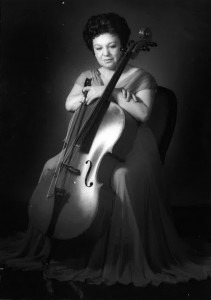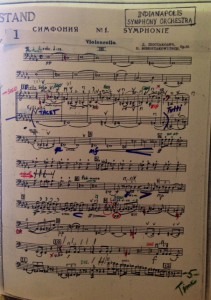
Shirley Tabachnick
I arrived early for my first concert as newly appointed associate principal cello to make certain that I had all the tough parts well in hand. I carried my cello to my seat onstage. Shirley too soon came out onto the stage. She was not pleased. I was sitting there AHEAD and BEFORE her. I found out later that she sat down at the back of the section in the last chair to warm up, barely containing her ire. I had violated one of her (many) unwritten rules.

Cello solo page of the Shostakovich Symphony no 1, marked by Shirley
During week two we rehearsed the Beethoven Symphony No. 3, The Eroica. In the slow movement the conductor wanted a different bowing. This affected the entire string section and we quickly made the change. The principal bass couldn’t hear the discussion from the back of the stage. She had someone tap me on my shoulder to ask me for the correction. I stood up and turned around so could be heard. When I sat back down Shirley said stridently, “Don’t you ever do that again!” My face turned the color of the aforementioned scarf. Everyone heard the exchange. The cello section could hardly stand the suspense, eager for my reaction.
At the break I leaned over to Shirley and began by saying, “Shirley we are friends aren’t we?”
“Well, yes, of course…why…” she stammered.
“I know I am new and not familiar with the codes of behavior in an orchestra. Since we are friends, I hope that you will clarify the rules quietly and in private so I don’t inadvertently offend anyone or interrupt a rehearsal.”
The cello section silently cheered. She never did that again!
Rehearsal times, works and the order were announced ahead of time but changes sometimes occurred. At rehearsals the finalized schedule was posted on a large bulletin board. The upcoming program beginning on a Monday morning was the exceedingly difficult Mahler Symphony No. 5. I had to work on it! Shirley had finally gained enough trust in me to allow me to take the music—her music—home for the weekend. There was a rehearsal for a different program on Sunday.
I arrived Sunday in plenty of time to warm up. A quick glance at the bulletin board made my heart pound. The Mahler was on the schedule. I hailed the librarian. Nope, there was no extra part. As I donned my coat I hurried over to confess to Shirley, mumbling that I could get the music from my apartment and be back in time. Her look of disdain said it all. Just as I was about to exit the building I turned and saw Shirley practicing the Mahler. Remember her big black bag? She always carried photocopies of all the parts.
But when it came to the solos in the repertoire like for example, the cello solo from Shostakovich Symphony No.1, Shirley would make you cry with her warm, luscious sound and soulful playing. I tried hard to emulate her and I learned a great deal.
We sat together for only one year before she retired. Shirley invited me over to her home—a privilege in itself—and after giving me several of her prized house plants she told me that sitting with me as her stand partner had been one of her best years in the business.
Here she performs in the Lyric Trio with her husband Arthur Tabachnick who was the concertmaster of the Indianapolis Symphony during the time I was there.
The Lyric Trio plays Loeillet’s “Trio in b minor”
Arthur Tabachnik, violin; Shirley Evans, cello; and Hilde Freund, piano.



